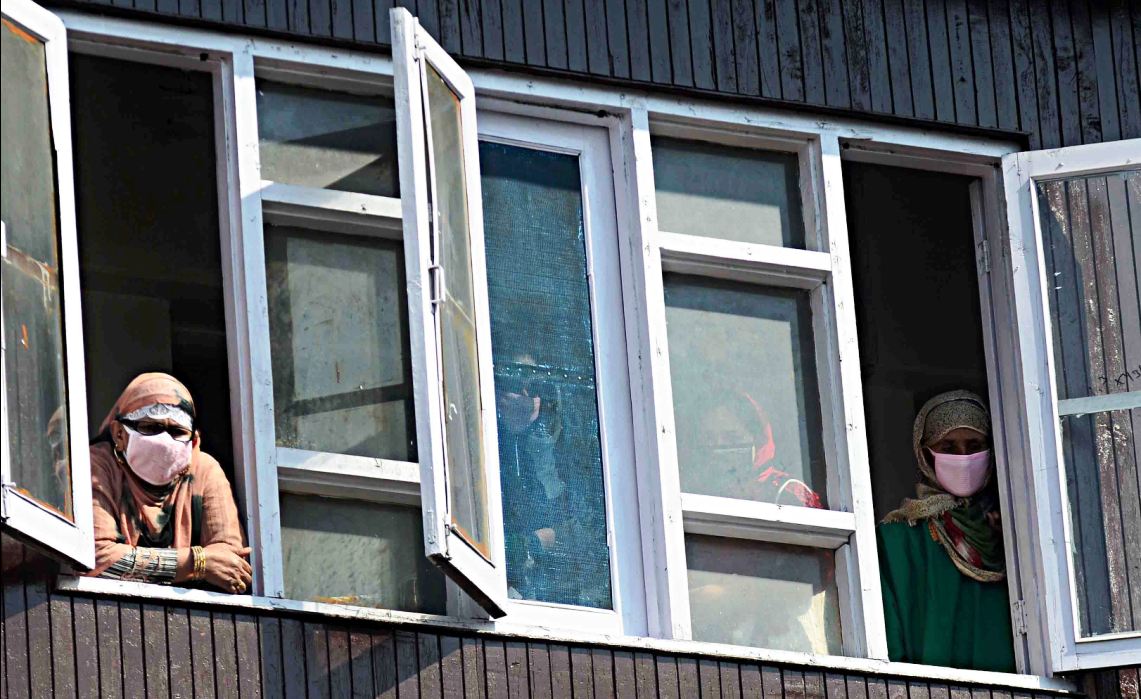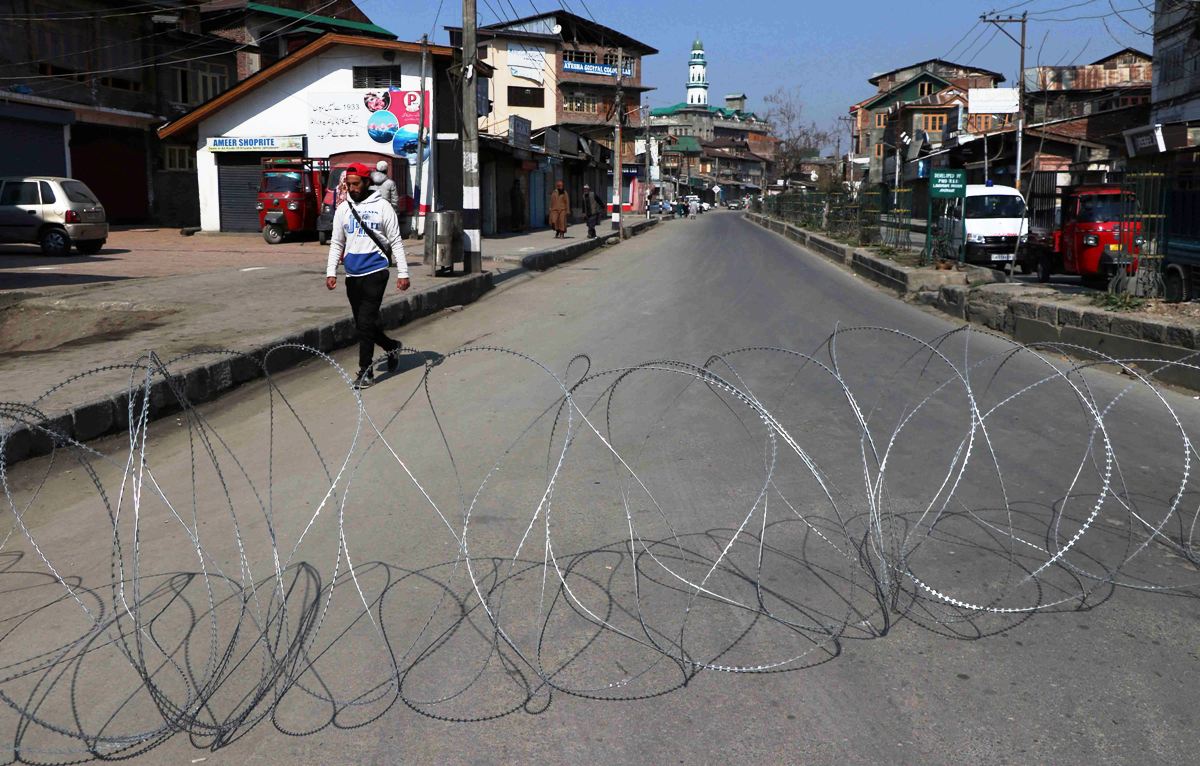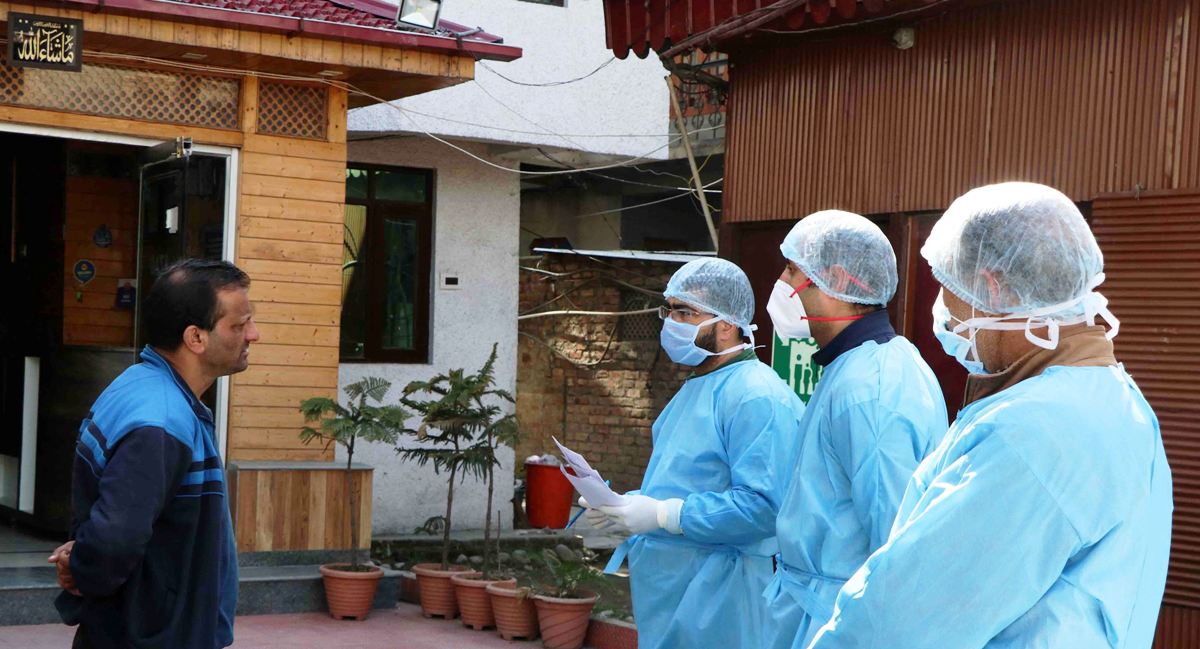Khalid Bashir Gura talked to a number of people from diverse backgrounds just to understand how they manage their life in the lockdown that is now in the second month

As the Coronavirus cases spike, tragedies unfold and life gets increasingly into quarantine. As more and more people restricted their movement, the family is reviving itself.
As the people rediscover the pleasures of spending time with family and getting used to new ways of communicating with the outside world, many are sad for their work is linked to the earnings.
Farooq Ahmed, a daily-wage earner is reclined on his pillow and stares at TV sadly. Farooq has to provide for a family of four – wife and two sons, aged 16 and 9.
It is not the first time that he is home spending time flipping TV channels and scrolling social media endlessly. At times he emerges on the veranda of his house, stretches his arms, calls out his sons and goes back to his room.
“My savings are swiftly exhausting. We have already been through worst lockdown recently and when life seemed to limp back to normalcy, we are pushed into another lockdown. I am worried about debts that I may have to incur to keep our hearth burning,” says gloomy, stubble-faced Ahmed.
Mrs Farooq prepares meals silently. She calls her sons Danish and Faisal who are playing in a nearby alley.
Danish is in the tenth standard. He along with the brother spends his time playing cricket in the narrow lane with their uncle, Aijaz Ahmed.
The brothers are often called by the parents to stay inside, wash hands frequently and study.
“The situation is frustrating. I have not been able to recharge my phone,” said Danish. “Nor able to use social media. And even if I will, my parents constantly nag about my using it. I may have to attend online classes soon. And how long a person can study. One can’t go outside and play because parents don’t allow it.” ” He is desperate to visit his maternal home at Rajbagh so that he can play at a less congested place with his cousins.
None of Danish’s friends is visible in the mohalla as their parents don’t let them go outside.

Unlike Farooq, his brother Aijaz Ahmed, a mechanic, has a shop at Lal Chowk. He has a family of five, besides father Ghulam Qadir, who also has a small shop at Lal Chowk and is a retired gardener.
Aijaz’s family is more social and jovial. His son Hashim, runs in alleys with his kite and spool.
Aijaz juggles between cricket with his nephews, and helping his daughters and wife with washing clothes, dusting rooms and run errands, which otherwise he rarely did.
“I can’t confine myself to the room. I go out only to remain level headed,” says Aijaz. “But I am also taking due precautions of wearing a mask, washing hands and not meeting a lot of people”.
Insha and Mehak, Aijaz’s teenage daughters remain busy with household work and sometimes they find time to study.
“We are used to these lockdowns. So we try to use our time best way” says Insha as she dusts up carpets.“I am thankful the internet is working. This allows us to study online and entertain ourselves by watching videos on social media”.
In South Kashmir’s, Pampore, Manzoor Ahmed, a businessman, is happy spending most of the time with his wife, two sons, aged mother and siblings.
“It is something I enjoy. I rarely had an opportunity to focus on family and some issues. I feel happy that I don’t have to deal with lots of people, sign cheques, attend customers or come home late,” says Manzoor who is also tearing down an old house nearby that they recently bought.
In the previous lockdown, he was able to carry out business from his home as well as attend customers but now the fear of virus has taken over and it is impacting his earnings.
Even though affluent he is worried about the impact of Coronavirus on business.
Zahid Ahmed Fareedi, a non-local working as a traditional-Kashmiri snack maker, is from Uttar Pradesh and lives at Habba Kadal. He has been in Kashmir for more than three decades and has experienced all lockdowns. A tenant in old city’s Habba Kadal, Zahid spends his time in his single room, praying five times.

“I spend my day on phone with my Kashmiri friends, apprising them of the difficulties that most of the non-locals are facing especially in procuring ration,” says Zahid. “I console my other non-local friends on phone and try to help them through Kashmiri friends. I ensure they get ration”.
Zahid complains about not being able to give full time and attention to the family because most of the time people of his community knock his door and ask for help. .
Fear of hunger, lack of work and drying up of resources are a source of anxiety with most non-locals.
Musa Mubark who is a research scholar and was always juggling between his research and teaching Quran at darsgah has now enough time to sit back and think and spend quality time with family that at times he yearned for.
Musa misses his packed schedules. He makes himself busy by running errands at home and helping his mother in washing utensils, making some dishes, and listening from his father interesting stories of his life.
Musa says that conversations within the family are an exhilarating experience. . Even though being confined to four walls is not new for Kashmiris this time it is more severe as social distancing is in place.
“The only respite this time is the internet and I can study, research and contact my friends,” he says. “After waking up I offer prayers, go back to sleep, and then wake up to have breakfast, study and help with chores in the kitchen”.
Shazia Jan teaches at one of the colleges in Srinagar. A mother of two sons, she has to manage meals, kids, and her online classes besides studying for herself.
“My two kids spend time with online classes and I have to be there to guide them as they cannot manage everything on their own. In the afternoon I teach my students online till 4 pm,” says Shazia.
She also has to compile study material for her online lectures.
Shazia ensures her kids don’t spend much time with phones and television but engage in creative activities.
Nazir Ahmed is a teacher at a government high school in Srinagar.
“This lockdown is different as we had just emerged from an eight-month-long siege. At least then we one could stroll and meet people in person or gather at a place, but the confinement of the last couple of weeks has felt like incarceration,” says Nazir.“One can’t socialize in times like these, as everyone seems suspect and the potential viral load carrier”.
Nazir spends his time in the evening with family and watching web series and movies.
“I conduct Google classes at home but only a few students turn up for online studies. Some have smart-phones and most don’t because of their humble backgrounds,” says Nazir.

Fayaz Ahmad Sheikh, a faculty member at the Centre for Innovation, Entrepreneurship and Strategy, School of Management, Zhejiang University at China had come to Kashmir for winter vacations and hasn’t been able to go back. But his life remains unchanged.
“I had mentally prepared myself for what was coming so I planned,” says Fayaz.
Fayaz envisions this lockdown as an opportunity. He is writing a book on innovations besides helping and guiding local innovators of the valley to scale up and connect with other scholars at Harvard and other places who help them make things like ventilators in times like these.
“I spend almost eighteen hours on my work,” says Fayaz.

Reshma (Abdul Rashid) who lives in Nawa Kadal and became a household name for folk songs wakes up in the morning, prays, and sits all day at home.
“The season of marriage was approaching and I had to go to many places but everything stands cancelled. We are at the mercy of Almighty. One can’t socialize in times like these,” he says.
Rafia Rahim, an RJ at 98.3FM, otherwise used to talking and meeting people is confined to her apartment away from home. She works from her apartment. Rafia has reconciled to the situation and tries to find something meaningful to do in her loneliness.
“Apart from work, I do things that make me happy. Above all the lockdown gives one time to think for oneself,” says Rafia.
Besides work, Rafia exercises every day. Being away from her family she connects with her parents through video calls.















